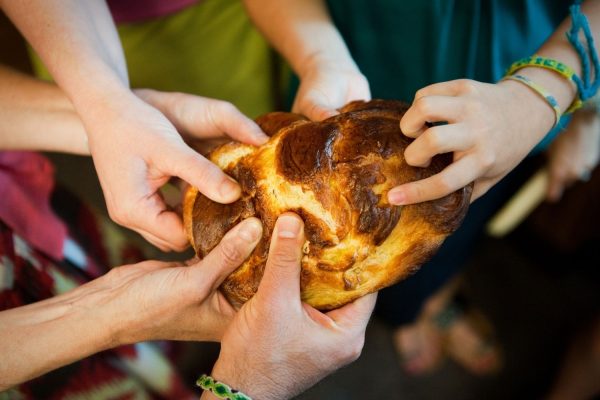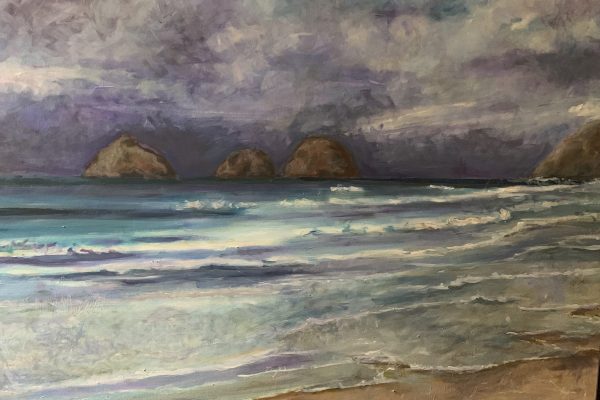The Haftarah of Pinchas tells the story of Elijah’s encounter with an angel and a subsequent journey in which he encountered the Holy Presence.
“And lo, the Lord passed by. There was a great and mighty wind, splitting mountains and shattering rocks by the power of God, but God was not in the wind. After the wind, an earthquake; but God was not in the earthquake. After the earthquake – fire; but God was not in the fire. And after the fire – a soft murmuring sound [a still, small voice]” (I Kings 19:11–12).
Rebbe Nachman of Breslov spoke of a “still, small voice” within him. He said that he could stand in a great throng of people and still cry out in this “still, small voice” from one end of the world to the other – and none of the people about would hear anything at all. He wrote this beautiful prayer about finding his “sanctuary within.”
The Way Home
Center of all existence
help me find the way
to that sacred sanctuary
within myself,
to that precious center of my existence.
Help me discover
my place in the world –
that space where I truly belong,
that space which belongs
unconditionally to me.
Dear God,
I’ve wandered for so long
Help me find my way home.
(LM I:188).
(In: The Gentle Weapon: Prayers for Everyday and Not-So-Everyday Moments, p. 102)
Psalm 131:2 says “I have stilled and quieted my soul.”
This meditation, inspired by these teachings, can be used to reflect on the Haftarah of Pinchas. It can also be used in a healing context, to help us find a quiet place within, a healing place, in times of stress, anxiety, pain.
The Meditation:
Sit quietly. Relax. Close your eyes. Take a few deep breaths, inhaling and exhaling slowly. As you inhale, imagine that you are breathing in waves of healing energy. Feel these waves flow through your entire body. Feel this energy embrace your soul force and your spirit. As you exhale, envision any negative energy – any pain, tension, stress, fatigue – being released from your body, carried away on the soft wind of your breath. With every breath, feel the narrow places within you opening, expanding, becoming filled with waves of deep relaxation and healing energy. Feel this happening in your feet, legs, hips, hands, arms, shoulders, abdomen, spine, chest, neck, head, face.
Imagine that you are walking in the desert. You hear the sound of the wind whisper through the desert sands. You feel the sensation of the wind as it brushes against your skin – softly, gently. Now this desert wind forms into a whirlwind. You note how it begins to glow – first with a soft light – then with a light that is more intense. You note the color of the light.
Now feel this glowing whirlwind wrap around you like a tallit, embracing you, filling you with warmth. See yourself in the center of the whirlwind. And in this place – in the heart of the whirlwind – is a place of serenity, a sacred space – Ha’Makom. And in this place, you hear a Voice gently whisper: “Be still and know that I am God.”
Know that from out of the whirlwind – from the midst of the storm – from deep, deep within you – comes a still, small voice. Listen – and you will hear this Voice in the soft wind of your breath. Listen – and you will hear this Voice in the rhythm of your heartbeat. Listen – and you will hear this Voice whispering through your soul. Know, sense, and feel this still, small voice to be the Ruakh Ha’Olam, the breath of God. It is always there for you – deep, deep within you.
Hold on to these images as you now become aware once more of your breath and the boundaries of your body. As you take a few deep breaths, become aware of the gentle rise and fall of your chest. Become aware once more of your presence in this room. Then – whenever you are ready – slowly, gently – open your eyes.
References
The Gentle Weapon: Prayers for Everyday and Not-So-Everyday Moments: Timeless Wisdom from the Teachings of the Hasidic Master Rebbe Nachman of Breslov. (2004). Adapted by Moshe Mykoff & S.C. Mizrahi with the Breslov Research Institute. Woodstock Vermont: Jewish Lights Publishing.
JPS Hebrew-English Tanakh. (1999). Philadelphia: Jewish Publication Society.










